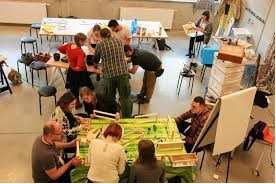The sovereign consults - good law builds
External practice
Duration
The project implemented in 2018-2019 has results that are used in everyday work.
Partnership
The Federation of Educational Initiatives (FIO) is a union of associations and foundations whose goal is to support civic activity and changes in education. FIO operates primarily for rural environments.
Reason it was developed
Educational law in Poland is constantly changing. Every year, several to several dozen amendments to provisions in legal acts and regulations are introduced. It is difficult for union members at the local level to follow all of them, not all of them are understood by them, and sometimes teachers and employees in the education sector are unaware of the consequences of the changes for themselves. Local structures of the union and ngos do not sufficiently participate in the process of consultations and issuing opinions on legal changes and in disseminating changes in their communities. The aim of the project was to raise the level of expert competences among 380 trade union’s members (304 women, 76 men), representatives of the ZNP as well as associations and foundations involved in educational activities in the field of the legislative process and law-making at the national level. In addition, it was important to make members of the ZNP aware that they can also cooperate with NGOs in the process of giving opinions, and that such cooperation can bring mutual benefits.
Activities
The aim of the project was to introduce the subject of law-making and to increase the possibility of consulting draft legal acts by citizens. The participants of our project learned: • how to read and understand the content of laws and regulations; • how to compare amendments with changed documents; • how to evaluate them and formulate conclusions; • how to organize and conduct consultations in your community; • how non-governmental organizations and trade unions function; • where the public funds for education come from and how they are spent; • how subsidies are granted for the running of educational institutions.
Results
Participants took part in 57 stationary trainings, 3 trainings on the Moodle platform and 12 webinars, the program of which was developed on the basis of an earlier analysis of training needs. The trainings were held in 16 voivodeship cities. The training program covered the following topics: 1. Raising the knowledge and skills of participants in the field of participation in law-making • Role and functions of the adopted law; what features make the law judged as good; • The system and regulations (Polish, European) of law-making: legislative initiative, procedures for its launch, institutions participating in various paths and stages of the procedure, standards, procedures for initiating and joining the law; • Rules for issuing regulations; • Financing of education: analysis of the state budget earmarked for education - an algorithm for the distribution of the educational subsidy, targeted subsidies, rules for the use and settlement of funds transferred from the budget by the local government, analysis of the effectiveness of spending funds by local government units; subsidizing other entities running educational institutions; • Methodologies for assessing the economic and social effects of legal changes. 2. Increasing the knowledge and skills of participants in the scope of participation in consultations and their organization in the environment • The process of planning and organizing public consultations: 7 principles of public consultations, the canon of local public consultations; • Key competences of the consultation animator, the role of local animators, experts, opinion leaders; • Principles, tools and methods of conducting public consultations (expert, common, representative) institutions obliged to them, gaining stakeholder engagement (quantitative and qualitative); • Planning time and dates of conducting - law and practice; • Public consultations in the environment - legal basis, their planning and conduct, techniques and tools for conducting consultations (research tools, communication, procedures, organization of the course, monitoring, conclusions and recommendations). 3. Raising the knowledge about the activities of NGOs and social partners and the ability to analyse financial statements • Legal basis for the activities of non-governmental organizations and social partners; • Parties, rules and forms of social dialogue; • Cooperation of the employer (the leading body) with trade unions, the role and competences of local structures of different organisation – confederation of employers and employees; • Functioning of the enterprise running educational institutions - establishment, goals of operation, economics, management, auxiliary role • Accounting, legal conditions; • Preliminary and index analysis of financial statements, information content of financial statements; • The specificity of subsidizing other entities running educational institutions (rules for calculating the amount of subsidies, spending and accounting); • The next stage were 3 on-line trainings carried out on the Moodle platform, deepening and extending the knowledge acquired during classroom training.
Funding
UE / ZNP The project was co-financed by European funds under Priority Axis II. Effective public policies for the labour market, economy and education, Measure 2.16 Streamlining the law-making processes - competition projects, support from the European Social Fund, the Knowledge Education Development Operational Program (OP KED) 2014-2020.